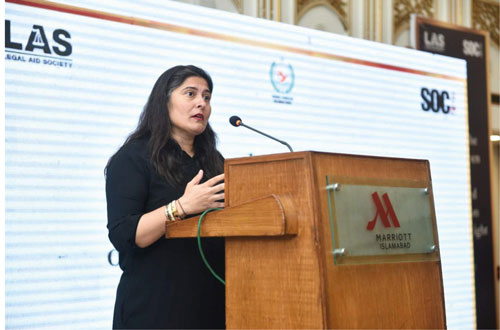5 documentaries showcasing women’s powerful narrative launched
Zubair Qureshi
A woman’s right and ability to own, inherit and control property is a key factor in achieving economic opportunity and development as well as empowerment, security, shelter and livelihood.
This also increases her power to make decisions in the household, exercise the option to leave toxic domestic environments and build wealth and autonomy.
These views were expressed by speakers at a conference that coincided with the launching of five documentaries aimed at spreading awareness on women’s rights to property and the legal pathways provided to women to protect their rights and access the laws of Pakistan.
Members of civil society, women rights activists, former judges, students and minorities’ rights activists attended the event that was jointly organized by Legal Aid Society (LAS), Sharmeen Obaid-Chinoy (SOC) Films and the National Commission for Human Rights (NCHR) at the Marriott.
Unfortunately, in Pakistan, despite guarantees under law and religion enabling and protection women’s right to own and control property, women still find their control and decision-making power wrenched away from them due to retrogressive norms and socio-cultural perceptions and practices, the speakers said adding Pakistan ranked 153 out of 156 on the World Economic Forum’s Global Gender Gap Index 2021.
About the five documentaries, Sharmeen Obaid-Chinoy said they were directed with the single aim i.e., to raise awareness surrounding these inheritance rights for women.
SOC Films directed and produced these documentaries, which were also showcased at the conference, and highlighted issues faced by the female gender and detailing the powerful narratives of women from across Pakistan as they battle through the challenges of accessing justice to acquire their property.
She said, “We have the legal framework in place for inheritance rights but mostly, women both in rural and urban areas are unaware of the existence of these laws that protect and empower them. This lack of knowledge plays a major role in their unequal participation in the society. And with this initiative and these documentaries, we aim to help create awareness and strengthen women’s rights to property in Pakistan.”
There is a general exclusion of women’s narratives from the dominant storylines we see highlighted in the discourse around economic empowerment. The narrative around empowering and uplifting women to realize their legal property rights has to be created by and with women.
Barrister Haya Emaan Zahid, CEO LAS while speaking on the occasion said our society had to be receptive to hearing their experiences as opposed to drowning them down with mythical norms. This is what LAS, SOC Films and NCHR are trying to do- we are facilitating women so they can identify and explain their challenges in accessing justice and are helping them win these battles.
The conference also contributed to the discourse on women’s right to property on various themes, including, attitudes and practices barring women’s access to property; women as invisible citizens as most women in Pakistan do not have complete documentation or CNICs; female face of poverty as most women in the cultural context of Pakistan do not possess the means or opportunity to build property or wealth; access to grievance redressal mechanisms due to lack of mobility and unsafe environment; and lack of recognition of issues as “Legal” when it comes to women due to patriarchal customs.










